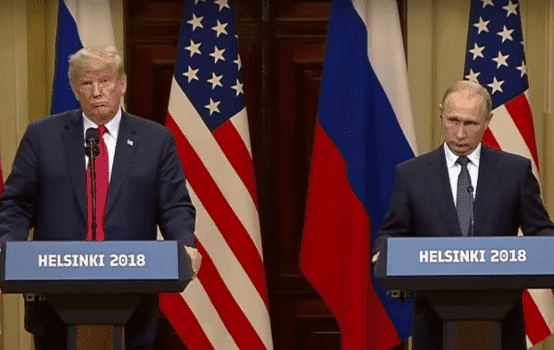
Donald Trump and Russian President Vladimir Putin only just wrapped up their summit meeting in Helsinki, but the bottom-line verdict across the media and foreign policy establishment is that the entire affair was a disaster. Or, in Senator John McCain’s words, “one of the most disgraceful performances by an American president in memory.”
The object of contention was not the topics of discussion, the political concessions Trump might have made to Putin, or even the meeting itself; it was Trump’s brief equivocation over Moscow’s interference in the 2016 presidential election. As he did on Air Force One last year, Trump seemingly took Putin’s denial at face value, as though the Russians had no incentive whatsoever to mess around with the American election system. This time, however, was different: not only did Trump miss the opportunity to reprimand Putin in public, he also suggested that Putin’s word on the issue was more reliable than the unanimous assessment of America’s intelligence community, an appraisal that has since been confirmed by separate investigations in the House and Senate intelligence committees. It was as though Trump, deliberately deluding himself for the sake of his ego, thought that if he accepted Putin’s explanation, American-Russian relations would magically morph into a new special relationship. Reporters in the room covering the event were “stunned.”
We may never know whether Trump was more aggressive with Putin in private over Russian cyber-hacking and spearfishing, but it probably doesn’t matter. Thanks to his press conference with the Russian strongman—a performance that Senate Foreign Relations Committee Chairman Bob Corker said “made us look as a nation more like a pushover”—Trump will be flying back to a Washington deep in speculation that Moscow holds a black bag of incriminating information over his head. How else can one rationalize Trump’s submissiveness to Putin?
If the primary objective of the meeting in Helsinki was to take a politically daring step forward in pursuit of a stabler and more constructive relationship with Moscow, Trump’s comments about Russian meddling have had an adverse impact on what is a completely reasonable foreign policy goal. Not even the most strident Russia hawk in Washington would argue that a rapprochement between the United States and Russia wouldn’t serve the national interest. These are two states, after all, with over 13,000 nuclear weapons between them (90 percent of the world’s nuclear stockpile) and that often find themselves on opposite ends of the issues. In Ukraine, Russian officers are supporting pro-Russian proxies against a Ukrainian army that’s receiving U.S. Javelin anti-tank missiles. In eastern Syria, Russian mercenaries are being obliterated by U.S. bombers. Russian ports are open to North Korean tankers, despite U.N. Security Council resolutions codifying an embargo on the Kim dynasty. And in America’s own hemisphere, the Russians are helping Venezuela’s Nicolas Maduro with debt restructuring as Washington cranks up the economic pressure in retaliation for his slide into authoritarianism.
- Trump Calls Off Cold War II
- The Coming American-Russian Alliance Against China
To leave American-Russian relations where they are at the moment would be the epitome of terrible statecraft. Trump’s assertion that a positive relationship with the Kremlin “is a good thing, not a bad thing” is an accurate one, even if he can’t explain why that’s the case.
The problem is that Trump has a habit of making things unnecessarily hard for himself. Washington is already dominated by intense and deep-rooted opposition to Russia that borders on paranoia. Republicans and Democrats don’t agree on much, but they stand shoulder-to-shoulder when it comes to punishing Putin’s government for its long list of international violations, overseas hit jobs, and disinformation campaigns. The last time Russia sanctions legislation was debated in Congress, it passed the Senate 98-2 and the House 419-3. In today’s political climate, cooperating with the Russians on anything is regarded as at best a waste of time and at worst an act of perfidy.
In short, getting American-Russian relations out of its years-long funk will be a heavy political lift—even if it is necessary. Donald Trump deserves his share of credit for swimming against the current when a large cross-section of the Beltway would rather pile on more sanctions, travel freezes, and ostracism. One can only hope that Trump’s rejection of the intelligence community’s assessment of Russia’s malign role in the last presidential election doesn’t allow the foreign policy establishment to strangle detente in its crib.
Daniel R. DePetris is a foreign policy analyst, a columnist at Reuters, and a frequent contributor to The American Conservative.
Sourse: theamericanconservative.com






